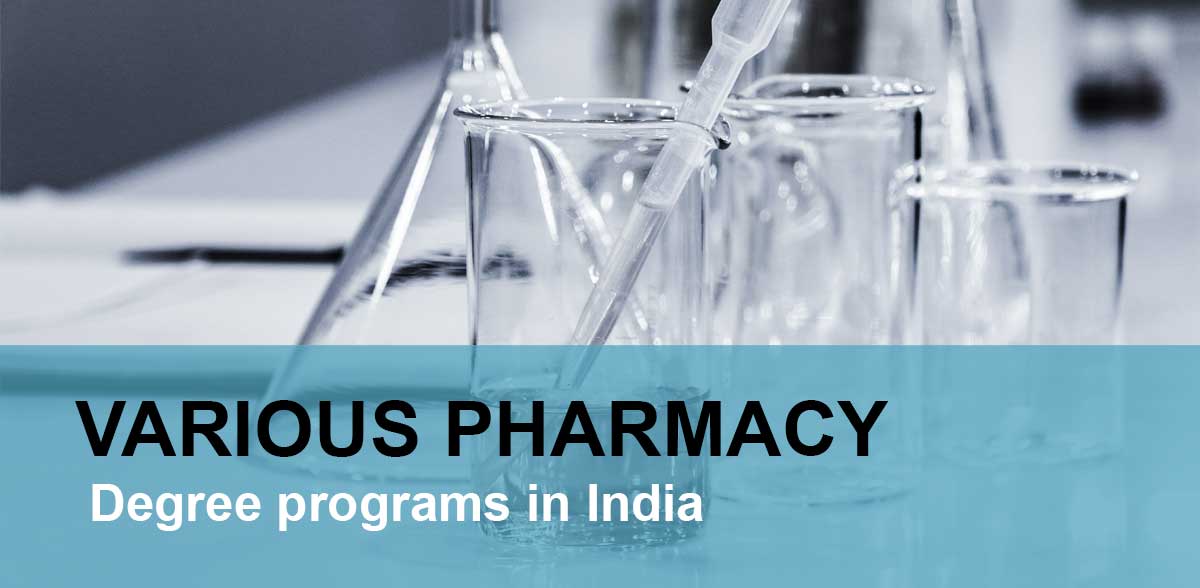
06,May 2020
Pharmacy degree programs in India - Type of Pharmacy Degree
Pharmacy is the health science that links medical science with chemistry and it is charged with the discovery, production, control, disposal, safe and effective use of drugs.
Pharmacy degree programs in India
The various Pharmacy degree programs which are offered in India are mainly:
- Diploma in pharmacy (D.Pharm),
- Bachelor of pharmacy (B.Pharm),
- Master of pharmacy (M Pharm),
- Master of science in pharmacy [MS(Pharm)]
- Master of technology in pharmacy [MTech (Pharm)],
- Doctor of pharmacy (PharmD), and
- Doctor of philosophy in pharmacy (PhD).
Pharmacy education in India is governed by two pillars:
- The Pharmacy Council of India (PCI), under the Pharmacy Act of 1948,
- All India Council for Technical Education (AICTE), established under the AICTE Act of 1987.
Read Also - Top Pharmacy College in Delhi NCR,
The PCI regulates regarding the standards ofeducation required for qualification as a pharmacist. It is responsible for registration of persons fulfilling the prescribed eligibility criteria (minimum D.Pharm) and issuing a license permitting them to practice in an Indian state.
The center has directed the state pharmacy councils for registering the pharmacists in their respective states. Thus, the PCI regulates the D.Pharm program and the recently introduced PharmD program. The BPharm program needs to be recognized by the PCI for the qualifications to be accepted for registrationpurpose only. The PCI has no jurisdiction over M.Pharm and other higher-level degree programs.
Along with the Pharmacy Act, Pharmacy education is also governed by the Drugs and Cosmetics Act of 1940, which elaboratesthe manufacture, distribution, and sale of drugs. Currently, there are no regulatory body and regulatory control for clinical pharmacy practice.
The Entry level for the various pharma Degree programs like D.Pharm, B.Pharm, and Pharm D programs is an extensive education in the various basicsciences.
Diploma in Pharmacy (D.Pharm) - The D.Pharm course requires a minimum of 2 years duration followed by 500 hours of required practical training anticipated to be completed within 3 months in either a hospital or community setting.
Bachelor of pharmacy (B.Pharm) - The B.Pharm involves 4 years in Institutions affiliated with universities or in a university department. Students holding a B.Pharm degree can earn an M.Pharmdegree in 2 years, of which the second year is most of research leading to a dissertation in any pharmaceutical discipline, for instance pharmaceutics, pharmacology, pharmaceutical chemistry, or pharmacognosy.
Master of pharmacy (M Pharm) - Recently, M.Pharm programs on Industrial pharmacy, quality assurance, and pharmaceutical biotechnology have been introduced and have gained a lot of appreciation in the Industry. To train the graduate pharmacists to provide clinical-oriented services, the M.Pharm program in pharmacy practice was introduced at JSS College of pharmacy at Mysore in 1996 and at Ooty in 1997. Students with an M.Pharm degree in any discipline can go ahead for a PhD with an additional minimum 3 years of study and research which provides them with a Doctorate.
Doctor of pharmacy (PharmD) - The PharmD program constitutes 6 years of full-time study. The Pharm D (post-baccalaureate) program is a 3-year program. The PharmD program was introduced in 2008 with the aim of producing pharmacists who had undergone extensive training in practice sites and could provide pharmaceutical care to patients highlighting the importance of pharmacy practice.
There is no standard B.Pharm curriculum and it varies across the universities that offer this degree. The course has more of Product and Industry oriented subjects. The majority of pharmacy colleges which are offering education are away from practice sites and there is no compulsory training in a practice site. The B.Pharm program of most of the Indian universities includes a combination of basic science (such as mathematics, physical chemistry, inorganic chemistry, and organic chemistry), advanced chemistry and analysis (such as biochemistry, medicinal chemistry, and analytical chemistry) and basic pharmacy (such as pharmaceutics, pharmacology, pharmacognosy, and pharmacy laws).
The M.Pharm degree program requires an additional 2 years of study after a BPharm degree (a total of 6 years of pharmacy Degree study). The MPharm degree is offered in many disciplines such as pharmaceutical chemistry, pharmaceutics, and pharmacology. There are two parts of the curriculum. The first year is an instructive course work (both theory and laboratory) and the second part involves completing a research projectunder the supervision of a pharmacy faculty member in a chosen discipline. Students who pursue an M.Pharm in industrial pharmacy may also undertake research projects in pharmaceutical industries during their second year of the curriculum.
The pharmacists with a B.Pharm or M.Pharm prefer opportunities in production, regulatory affairs, management and/ or quality assurance, and marketing with the pharmaceutical industry along with Pharmacy practice. Even a few of these graduates and postgraduates still opt to work in community and institutional pharmacies.
In India, the basic pharmacy course, the Diploma in pharmacy (DPharm holders)arethe only exclusive practicing pharmacists in the global sense, as they engage in community or institution pharmacy practice.
Pharmacy education in India, both at the BPharm and MPharm levels, has a curriculum which is more of industry and productoriented with a focus on the basic sciences.
But now the orientation of the pharmacists is changing from the products to the patient or more explicitly it is a risk and benefit assessment of product and the services both accounted together.
This expansion of the role of pharmacists received a change when the term pharmaceutical care was introduced. Pharmaceutical care is the responsible provision of drug therapy for the purpose of achieving definite outcomes that improve the patient’s quality of life.
Author
Sarika Mahtta
(Associate professor)